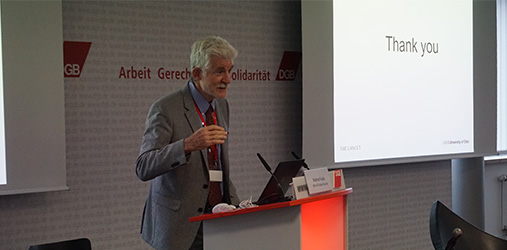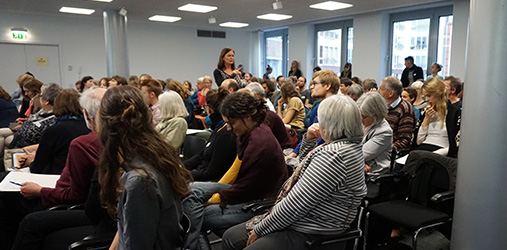
Desmond McNeill represented the Independent Panel on Global Governance for Health as the keynote speaker of the Conference Health-Economy-Perspectives on a just health policy held in Berlin October 10th 2016. The Conference was hosted by the development and human rights organisation Medico international and the German Platform on Global Health.
Trade unions, scientists, social organisations and movements were gathered to discuss in which ways for-profit interest groups influence health policies, and how this influence also increases the pressure on the public healthcare sector - with dire effects on democratic participation, the working conditions of healthcare professionals and, ultimately, on universal access to healthcare.
Desmond McNeill presented the work of the Lancet-University of Oslo Commission on Global Governance for Health on the political roots of health inequality and the need for global political solutions. He summarised the findings from the seven case study areas selected by the Commission, the analysis of the organisational dysfunctions that result largely from the political context which limits countries’ policy space, and the Commission’s conclusion that decisions in all political domains should be made with health at the core of thinking. He then summarised the work of the Independent Panel on Global Governance for Health, and their findings with regard to trade and investment agreements (TIAs).These often favour the interests of large multinational corporations, which exert disproportionate influence on national negotiating positions. TIAs can undermine governments’ ability to pass laws and regulations that protect and promote public health.
About the Conference
"(But) despite mounting global health problems, profit interest groups continue to influence health policies, which also raise the pressure on the public healthcare sector – with dire effects on democratic participation, the working conditions of healthcare professionals and, ultimately, a universal access to healthcare. But whose interests are guiding these policies? And what to make of the World Health Summit’s focus on private sector contributions to an improved healthcare provision in the future? We wish to discuss these questions with experts of the scientific community and the trade unions, as well as members of social movements and NGOs, emphasizing alternatives to the status quo and affirming our goal of a policy of health that is guided by human needs." (Extract from conference website)
